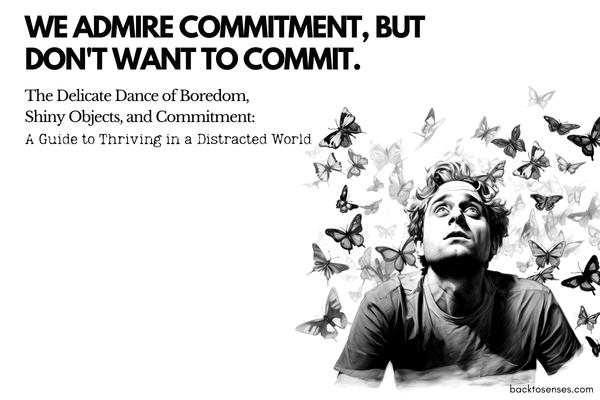Struggling with Shiny Object Syndrome? Maybe it’s time you got married to your projects and started bringing those babies into your life!
In a world brimming with endless possibilities and distractions, commitment seems to have become a rare commodity.
Many of us are ‘committed’ to our projects for as long as it’s effortless, fun and promising. And the moment it becomes more like work than fun, we start looking for a ‘better option’ to invest our precious resources.
Let’s take a look into the complex interplay between boredom, fascination with new things, and our struggle with commitment.
The Problem
Have you ever felt that it’s easier to binge-watch a whole series on Netflix than to stick to a diet or finish that project at work? You’re not alone.
The constant allure of newness creates a vicious cycle that can lead to a lack of engagement with our long-term goals. We’re caught in a delicate dance between boredom and distraction, where commitment seems to be wallflowering in the background.
Is that even a problem if it feels so fun?
I guess it’s not if you’re happy being a drifter rather than a driver.
But if you want to achieve anything meaningful, I suggest you keep reading, and more importantly, practice your commitment skills.
First of all, it’s only fun until it’s no longer fun.
Always looking for something ‘better’ is the ultimate enemy of everything good.
Modern World, Ancient Brain
The digital age has added a new layer to our evolutionary tendencies. With an avalanche of notifications, content, and opportunities, our environment screams, “Look here! No, here!”
“I could have been great, but I got distracted.”
The irony is palpable: In a world where options abound, instead of feeling empowered, we often feel overwhelmed. This “paradox of choice” makes us feel mentally exhausted.
Our cognitive bandwidth hasn’t evolved as fast as our tech, pushing us towards shallow engagements.
These fleeting interactions lead to decreased engagement and increased boredom. And what does boredom do? It pushes us to seek out the new and shiny. It’s a vicious circle!
You while you want to protect your energy, you actually end up wasting it on jumping around.
Why It’s So Difficult, Evolutionary Speaking
- Survival Instinct: We’re biologically wired to scan our environment for danger and opportunities (bottom-up attention). It’s not just a bad habit but an evolutionary trait that once kept us alive.
- The Mental Math: We continually assess whether what we are doing is worth the effort. Is there something better out there? We don’t want to lose, we don’t want to miss out. It’s not flakiness; it’s human nature.
- The Dopamine Dazzle: New things feel good because they’re rewarded with dopamine, creating a novelty bias that can be highly addictive.
How Our Environment Induces It
- Notification Nation: The constant pings on our devices ensure that we never have to get bored.
- The Paradox of Choice: We drown in options, thinking it’s good for us, but this cognitive load depletes us.
- Information Overload: Our mental bandwidth hasn’t changed, but the amount of information has increased dramatically, leading to a shallow and superficial engagement.
Commitment: The Quiet Agent of Success
One of the most profound yet often overlooked ingredients in the recipe for success is commitment to your most important work.
You need clarity to know where you’re headed, alignment to ensure that every step is in the right direction, focus to ward off the shiny distractions, and unwavering commitment to trudge through dry spells and motivational plateaus.
It’s the inner fire that keeps you going when the seas are calm and monotonous, and the waters seem endless.
Without commitment, clarity loses its vision, alignment becomes disjointed, and focus gets blurred.
What You Can Try Now to Change It
Break the cycle and reignite commitment.
- Identify the Loss of Engagement: The moment you feel your attention wane, understand whether it’s fatigue or just a mental itch for something ‘new’. If it’s the pull of the new, ask yourself what are the costs of switching again.
- Stay curious: Challenge your mind. When faced with boredom, get curious, ask questions, and your brain (aka a problem-solving machine) will want to solve the puzzle. Utilize that to your advantage.
- Practice: When you commit to a task, the initial pressure wanes. You stop negotiating with yourself all the time, and don’t waste time looking for excuses. Like settling into a long-haul flight, you can relax and focus. Focus on building commitment skills. Make embracing the challenge your commitment, and disarm your excuses.
The trick is to start small. Before diving into big commitments, start by finishing smaller tasks. That feeling of inner strength? That’s commitment in action.
When you want to practice commitment, it’s less about the thing you want to do – be it a daily run or writing online – and more about strengthening the commitment muscle.
The Power of Investment
The more you invest in something – be it time, energy, or resources – the more committed you’ll feel.
So, if you have an idea, marry it. Give it your undivided attention. Start with 2-3 weeks and project sprints to create momentum. Give it your all and see what happens.
To quote Justin Welsh, “People generally lack commitment. They think actioning one thing means losing their ability to do others.” But true mastery lies in balancing playfulness with determination, flexibility with commitment.
It requires continuous engagement, a curious mindset, a long-haul perspective, and relentless practice. Embrace it, and you’ll find that you’re not just surviving in this distraction-laden world but thriving. Commitment might not be the shiniest object in the room, but it’s definitely the most valuable one.
Mastering commitment amidst the glitters of distraction is indeed an art.
Thanks for reading BACKTOSENSES’s Newsletter!
Subscribe for free to bridge your Intention-Action Gap!


